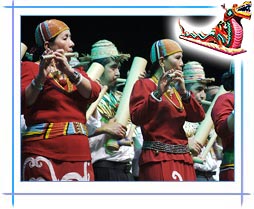Malaysia is a multi-cultural country and none of its cultural arts is untouched by the influence. Applying the same theory for music, it had inclinations of Indonesian, Thai, Portuguese, Filipino and Chinese composition. Malaysian music which was influenced by various cultures got evolved with the passing time and secured its individual identity. In different parts of the country, there live people of many racial groups who have their own musical preferences, like Arabic Ghazals are popular in Kuala Lumpur and Rongeng music is preferred in Malacca.
 Instigated from Arabia, Zapin music is loved all over the country. In
fact, the present culture is soon catching up the taste of Europeans and
Americans and thus, scores of pop singers and rock bands are emerging
here. Regarding traditional music of Malaysia, it is based on Gamelan
which is a stringed instrument having ethereal and stifled sound.
Earlier, Gamelan accompanied by the hypnotic beats of Malaysian drums
used to make the background music for dances in the courts.
Instigated from Arabia, Zapin music is loved all over the country. In
fact, the present culture is soon catching up the taste of Europeans and
Americans and thus, scores of pop singers and rock bands are emerging
here. Regarding traditional music of Malaysia, it is based on Gamelan
which is a stringed instrument having ethereal and stifled sound.
Earlier, Gamelan accompanied by the hypnotic beats of Malaysian drums
used to make the background music for dances in the courts. Today, Rebana Ubi serves as the ceremonial instrument and often played to strike refined music. Keeping up the time-honored heritage, Giant Drum Festival is arranged every year in Kelantan where eminent players across the country come to show their talent. Another popular traditional instrument which is used commonly in social occasions is Kompang. Pronounced "sa-peh", Sape is a convention lute from Central Borneo, popular in Malaysia. It is used habitually by the Kenyahs, Kayans and Kelabit tribes in Sarawak.



